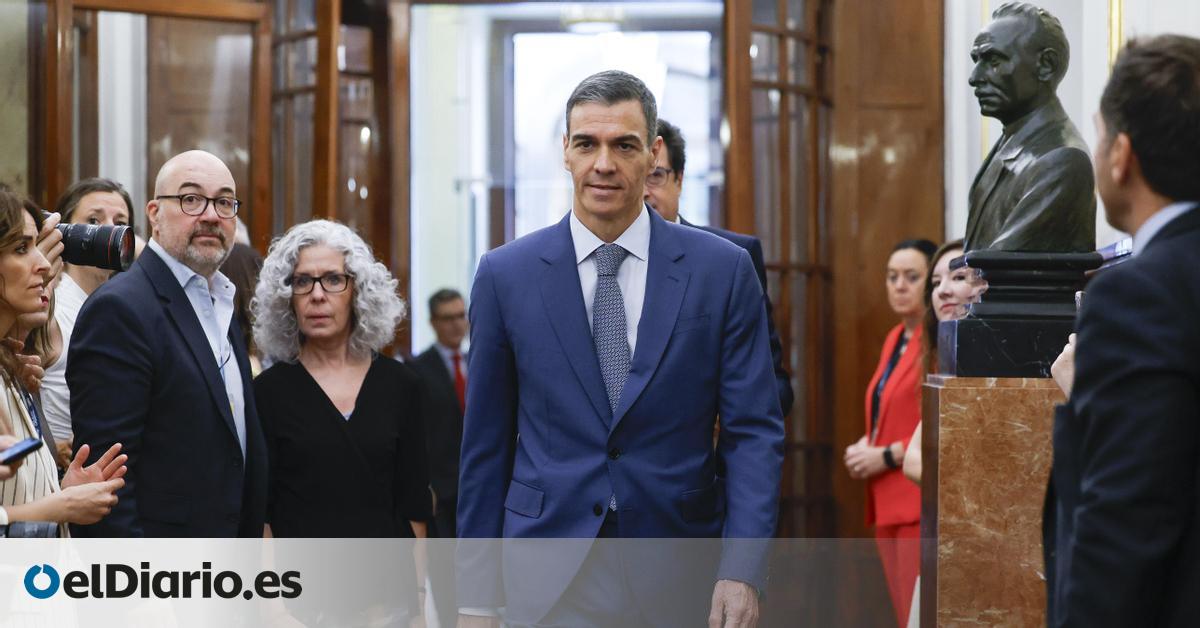
Pedro Sánchez puts up the consensus at the NATO summit next week in The Hague. The President of the Government has rejected the proposal to raise military spending to 5% of GDP in a letter to the secretary general of the organization, Mark Rutte, in response to which the Dutchman sent to the heads of government on Wednesday, in the prolegomena of that annual appointment. The president of the Government argues that this figure is “counterproductive” and incompatible with the maintenance of the welfare state and asks the organization “flexibility” for each ally to comply with the capabilities that it requires and that in the joint declaration an “optional spending objective” appears.
“Spain cannot commit to a specific objective of spending in terms of GDP at this summit,” Sánchez replies to the proposal made by NATO, which proposes to reach 5% of GDP in military spending in 2032, which is the requirement of Donald Trump to the allies. For Spain, 5% would mean an annual expense of 80,000 million euros the defense spending. The president of the Government gives three arguments to Rutte to tell him no.
Sanchez offers 2.1%
The first is the same as the Minister of Defense, Margarita Robles, a couple of weeks ago before her counterparts of the Atlantic Alliance: Spain argues that, with a very slight increase in defense expenditure, you can meet the capabilities objectives established by NATO. Rutte does not agree with that statement and argues that the new objectives force a generalized increase. Sanchez believes that perhaps some countries have to raise their 5% expense to meet the requirements required by NATO, but that Spain, no. The figure to which the government is willing to reach is 2.1%.
“For Spain, fulfilling 5% would be not only irrational but counterproductive since it would move Spain away from optimal spending and hinder EU’s efforts to strengthen its security and defense ecosystem,” he says in the letter. What Sánchez argues is that the community club is working on interoperability, joint purchases or the balance of transatlantic defense -looking to Russia, but also to the South Flannco, which is essential for Spain or Italy -and that it needs “maneuvering margin”.
Flexibility and optional spending objective
The third argument that Sánchez says is that reaching 5% would be “incompatible” with the maintenance of the welfare state and remember that, at least for Spain, reaching that figure is impossible without “raising taxes to the middle class, cutting public services and social benefits of citizens” as well as harmful to the green transition or developmental help. However, that does not imply a problem for Routte, one of the ‘hawks’ of fiscal discipline in his time as Dutch prime minister.
“It is the legitimate right of each government to decide whether or not to make those sacrifices. And as a sovereign ally, we choose not to do so,” says Sánchez, who opposes, therefore, radically, the proposal for a joint declaration, which requires the unanimity of the 32 NATO member states. However, the president argues that he does not want to “obstruct the results of the summit” that will be held next week in The Hague and raises “a more flexible formula in this year’s statement”, which allows each ally to choose the way to meet its capabilities objectives and enter “an optional spending objective”.
“The formula that I propose would allow us to preserve the 5% objective in the statement for those allies who need it or who want to pursue it,” Sánchez’s letter ends in reference to the figure Trump has imposed on allies. Sánchez’s intention is, therefore, to negotiate that 5% goal and that it is voluntary, but Trump and the majority of allies will make it very difficult because they agreed on that figure. And the US president has made it clear that he wants the allies to shoot the expense up to 5% and do not seem to agree with softening his demand.
At the moment in NATO they limit themselves to saying that the negotiations are “underway” in the face of next Tuesday. Spain is the country that with more vehemence is opposing the new 5%objective, but there are other countries, such as Italy, Canada, the United Kingdom or Luxembourg that have expressed doubts, and one of the issues that is being raised is to extend to 2035 the time limit to meet that percentage.
Source: www.eldiario.es

